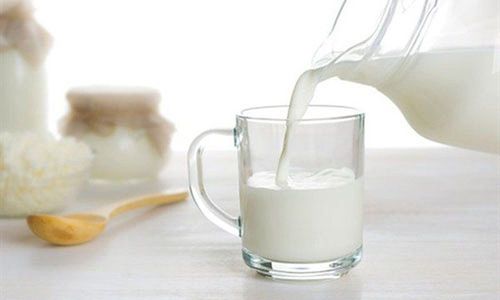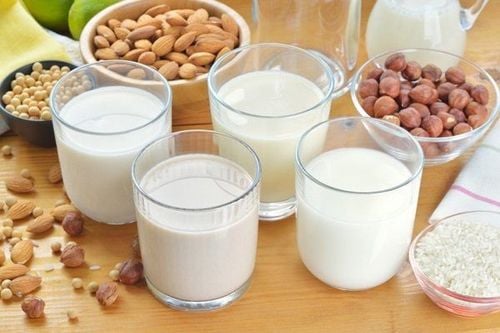This is an automatically translated article.
Many parents will wonder when to give their babies cow's milk. According to nutritionists, parents should stop breastfeeding until the child is between 9 and 12 months old before giving cow's milk. This is because young children are not ready to digest this substance and can develop iron deficiency if they drink too much cow's milk and don't eat enough iron-rich foods, such as meat, eggs and cereals.
1. Why wait until the baby is at least 12 months old to use cow's milk?
Cow's milk contains high levels of protein and minerals, so the digestion of cow's milk will not be as easy as when digesting breast milk or formula, with such a high content can strain the baby's kidneys. Besides, cow's milk does not have enough iron, vitamin C and other nutrients for young children, it can even cause iron deficiency anemia in some children because the protein in cow's milk can cause irritation. lining of the digestive system, leading to blood in the stool. It's also worth noting that cow's milk doesn't provide the healthiest fats for growing babies. However, when the baby's digestive system is ready to absorb cow's milk, mothers can add in the baby's diet solid foods including grains, vegetables, fruits and meat. Your baby's stomach and kidneys also get stronger after 12 months of age, which is the ideal time to start giving your baby cow's milk.
2. Why children should start drinking cow's milk
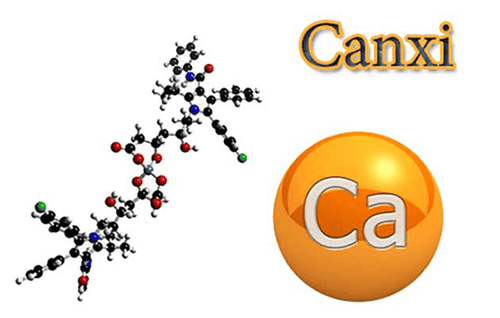
Sữa bò chứa nhiều nguồn dưỡng chất thiết yếu như canxi giúp xây dựng xương và răng của trẻ chắc khỏe
3. Should you stop breastfeeding when your baby starts drinking cow's milk?
The American Academy of Pediatrics (AAP) has said: as long as mothers still want to breastfeed and babies still prefer to breastfeed, mothers should still breastfeed their babies after the first birthday. Therefore, it is not necessary to wean children when they are supplemented with cow's milk. However, mothers should give their babies milk from a cup instead of a bottle. Bottle-feeding will cause milk to collect around the baby's teeth, which is the cause of tooth decay. Therefore, please guide your child to drink water and milk with a cup when he reaches 12 months old.
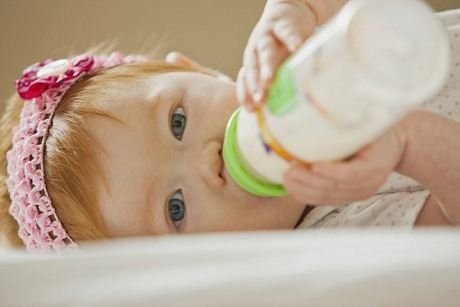
Trẻ bú bình sẽ khiến sữa đọng lại quanh răng có thể gây ra sâu răng
4. How much cow's milk should children drink?
According to the American Academy of Pediatrics (AAP), when a 1-year-old can get enough calcium and vitamin D, 473ml of cow's milk (16 ounces) or the equivalent amount of other dairy products such as yogurt, cheese, and yogurt should be used. roof. When children reach 2 years old, mothers should increase the amount of cow's milk from 473ml to 592ml (18 ounces) or other dairy products every day. However, mothers should also note that children should not drink more than 946ml of milk (32 ounces) per day, too much milk will make the baby's digestive system not have room for other necessary foods to complete. improve their diet and interfere with the absorption of iron in children. If the baby is thirsty, the mother can use water instead of milk.
For babies who prefer cow's milk to solid foods, it is best to give them after meals or with a morning or afternoon snack instead of before meals.
5. Can mothers give their babies fat-free or reduced-fat milk?
According to the American Academy of Pediatrics (AAP), mothers should give their babies 1 year old whole milk unless they are at high risk of obesity. Babies this age need the higher fat content of whole milk to maintain a normal weight and help the body absorb vitamin A and vitamin D. The protein and mineral content in fat-free or low-fat milk is just too good. high for children of this age. When babies are 2 years old or older, mothers can decide to switch to low-fat or fat-free milk for their babies to best meet their baby's developmental needs. For possible exceptions, your child's doctor may recommend giving your child low-fat (2%) milk after one year of age if the child is overweight or obese, or has a family history of diabetes. overweight, obesity, high blood cholesterol or metabolic cardiovascular disease.
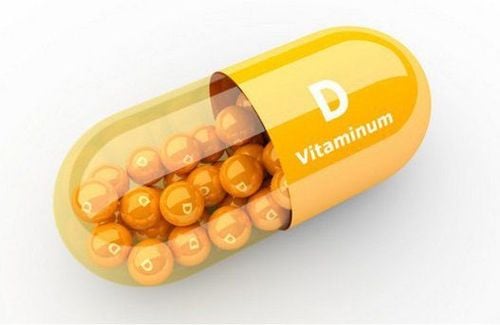
Trẻ uống sữa nguyên chất giúp duy trì cân nặng bình thường và cơ thể có thể hấp thụ vitamin A và vitamin D
6. What to do when the child does not want to drink cow's milk?
Most children love to drink cow's milk, but not all. There are babies who will perceive the difference between the taste, temperature, and texture of cow's milk as different from breast milk and do not like the difference. To improve this condition, mothers can mix cow's milk with a little breast milk or formula milk, should try one part cow's milk with 3 parts breast milk or formula. After a few weeks, change the ratio until the baby adapts to the taste of cow's milk, then you can let the baby drink 100% cow's milk. In addition, mothers can add milk to their baby's cereal, make soup with milk instead of water, use it to make other snacks such as yogurt, cheese, pudding, custard or milkshake, etc. .. or process milk into sauces or in children's daily dishes.
7. What happens when children cannot drink milk or dairy products because the parents are vegetarians?
When children do not get calcium and vitamin D from cow's milk and other cow's milk products, soy milk can be used to fortify or supplement calcium and vitamin D. Besides, oat milk or coconut milk is also good. As a good choice for mothers, these milks also contain high levels of calcium, which can be used as a substitute for cow's milk.
8. Should use organic milk or skim milk, low fat for children

Sữa bò ít béo và không béo có hàm lượng vitamin và khoáng chất ít hơn sữa nguyên chất
There are no studies to show that organic milks are better for children, but using them has no effect on the health of children. However, the price of organic milk will be more expensive, mothers should consider before making a decision. However, the American Academy of Pediatrics has warned against giving raw or unpasteurized milk to babies. As for unpasteurized milk, the milk may contain harmful bacteria or parasites, which will cause health problems for the baby. But no matter what type of milk, mothers should always choose whole cow's milk for their babies. Some skim (fat-free) and low-fat (1-2% fat) milks contain very little fat to meet your child's nutritional needs. Furthermore, skim and low-fat cow's milk contains high levels of protein, potassium, sodium and chloride, which can overload a child's kidneys. Vitamin and mineral content is also lower in low-fat and fat-free cow's milk, which makes whole milk a better choice for babies.
9. Can a child have a cow's milk allergy?
If babies drink formula made from cow's milk at an early age without any problems, mothers can rest assured that babies can tolerate cow's milk normally. Even if babies are exclusively breastfed for the first year, they can still be exposed to cow's milk because babies can be exposed to cow's milk proteins from breast milk. In some cases, children are advised by doctors to drink soy milk before, so consult a doctor before giving cow's milk to children. However, cow's milk allergy is really uncommon, affecting only about 2-3% of children worldwide and almost all children grow faster when cow's milk is added to their diets. But mothers should also be careful when the child has symptoms such as rash (maybe around the mouth, chin), abdominal pain, diarrhea, vomiting, itching, swelling, and chronic nasal congestion, runny nose, cough , wheezing or difficulty breathing can all be signs that your baby is allergic to cow's milk. When you see more severe reactions such as pale skin, weakness, hives all over the body, swelling in the head or neck, bloody diarrhea, etc., immediately take the child to the nearest medical facility.
If children are allergic to cow's milk, mothers should be careful when using foods such as cheese, condensed milk, ice cream, yogurt, margarine containing milk, chocolate milk powder,... Mothers can refer to the ingredients of a food listed on the label by the manufacturer to ensure that the food is free of milk or dairy products.
For children to be healthy and develop well, it is necessary to have a nutritious diet in terms of quantity and quality balance. If children are not provided with adequate and balanced nutrients, it will lead to diseases of excess or lack of nutrients, which adversely affect the comprehensive development of children in terms of physical, mental and motor skills.
Parents should supplement their children with supportive products containing lysine, essential micro-minerals and vitamins such as zinc, chromium, selenium, and B vitamins to help fully meet their child's nutritional needs. At the same time, these essential vitamins also support digestion, enhance nutrient absorption, help improve anorexia, and help children eat well.
Parents can learn more:
Signs of zinc deficiency in children
Micronutrient deficiency and failure to gain weight in children
Please regularly visit Vinmec.com website and update useful information to take care of your child. Take care of the baby and the whole family.
Reference source: babycenter.com; madeformums.com; momjunction.com







